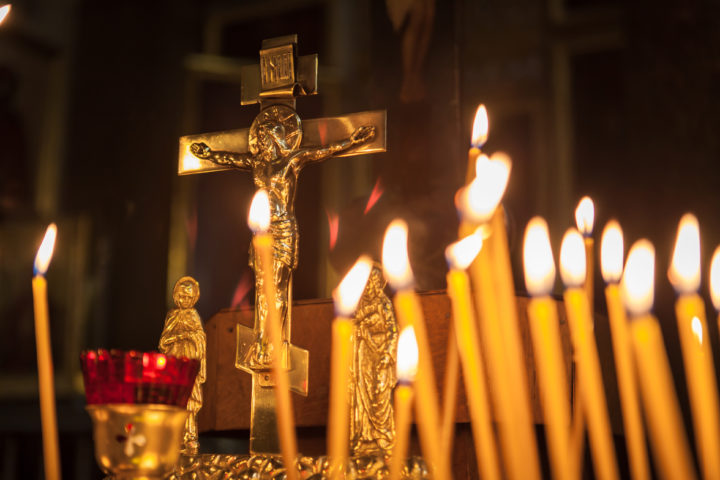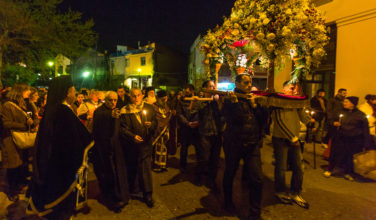Greek Orthodox Holy Wednesday (Holy Unction) Religious Service Overview
Comments Off on Greek Orthodox Holy Wednesday (Holy Unction) Religious Service Overview
 Holy Wednesday service occurs during Holy Week in the Orthodox Christian church. It is a celebration of Christ’s Holy Unction. This sacrament encompasses healing and the celebration of the victory of Christ over sin and death. It allows Christians to live lives that are courageous, full and hopeful in all aspects.
Holy Wednesday service occurs during Holy Week in the Orthodox Christian church. It is a celebration of Christ’s Holy Unction. This sacrament encompasses healing and the celebration of the victory of Christ over sin and death. It allows Christians to live lives that are courageous, full and hopeful in all aspects.
The service on Holy Wednesday is more focused on the forgiveness Christ has offered Christians over sin. The resurrection brings about the sanctification of life, showing our dependence on God. There is a specific order that occurs within the service in order to ensure the ceremonies are completed correctly. Holy unction is also usually given at this service. Here’s more information:
About the Holy Wednesday Service
Beginning of the Service
The service begins with introductory prayers that highlight the basis of forgiveness. Psalm 143 and Psalm 51 are also read in which God’s cleansing powers over sin are highlighted. These readings and prayers encourage Christians to seek forgiveness for all of their wrongdoings.
The second part of the service is the Canon. The Canon is a set of passages of Scripture that are read or sung allow to seek God’s forgiveness and mercies. This part of the service encourages evil to flee and salvation to enter. A gratitude to God will always be brought back as the most important aspect.
Prayers to the Saints
Prayers to the Saints is the next part of the Holy Wednesday service. These prayers to the Saints are also called Troparia to the Saints. It is important to pray to those who have helped to heal the sick or who have preached the Gospel to a point of martyrdom. It is also important to pray to Mother Mary to speak on the Orthodox Christian’s behalf.
The first specific Saint to pray to is Demetrios who was a martyr and healer of the ill. The second is Saint Panteleimon of Nicodemia who was a doctor who was also martyred. The final are the unmercenaries who are Cosmas and Damian who healed without pay.
Gospel Lessons
Before the conclusion of the service, Gospel lessons or readings and prayers are given. These Gospel readings encompass passages in James, Luke, Romans, 1 Corinthians, Matthew, 2 Corinthians, Galatians and 1 Thessalonians. All of the passages focus on the redemptive power of Christ and the forgiveness of sins.
After each of the sets of readings, there are prayers that are recited. These prayers are focused on forgiveness, healing and eternal life. After the seventh prayer and reading, the Priest will lead the congregation in a prayer and will lay the pages of the Scripture on a sick person’s head to pray for healing.
End of the Service
At the end of the service, there will be an anointing. This anointing will be given to Christians who are in good standing. The anointing is the Sacrament of Holy Unction given through a special prayer by the priest.
Holy Wednesday prepares Christians’ hearts and minds to forgiveness in preparation for the celebration of Christ’s death, burial and resurrection. It is important to focus on Christ’s divine nature that brings about resurrection and mercy. Through Holy Wednesday, hearts are brought back right with God.
Hymns Sung During Holy Wednesday
Here is a look at the words to the hymns that are sung or chanted during this service:
Apolytikion of Holy Wednesday
Plagal of the Fourth Tone
See! The Bridegroom sets forth in the dead of night. And blessed is that servant whom he shall find on watch; unworthy the one he shall come upon lazing. See to it, soul, that sleep does not overtake you, lest you be given up to death and be shut out of the kingdom. Bestir yourself, then, and sing out: “Holy, holy, holy are You, our God; by the power of Your Cross, save us.”
Kontakion of Holy Wednesday
Fourth Tone
Though I have outdone the harlot in sin, yet I have offered You no shower of tears. Rather, I fall before You fervently kissing Your spotless feet, praying silently that, as Master, You will remit my debts as I cry: “Savior, free me from the foulness of my deeds!”
Source:
Categorized in: Greek Easter Traditions, Greek Orthodox Religious Information
This post was written by Greek Boston





